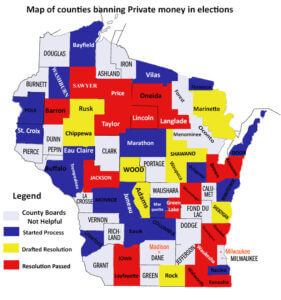Republicans are playing the long game in the fight to ban “Zuck Bucks” nationwide, and in Wisconsin they’re entrusting it to voters on the state’s April 2024 primary ballot.
The Federalist first reported on Republican legislators’ strategy to get a constitutional amendment on the ballot next year, giving Wisconsiners the power to ban private funding for elections. Twenty five states have already done so, and in purple Virginia and Pennsylvania with Democratic support.
The need couldn’t be more urgent. Most Americans are now familiar with partisan billionaire Mark Zuckerberg’s plot to funnel $420 million to thousands of local election offices in 2020, using the once-obscure Center for Technology and Civic Life (CTCL) in Chicago. CTCL marketed its Zuck Buck grants as a way to shore up budget constraints and help Americans vote during the COVID-19 pandemic.
In reality, the funds flowed to Democratic strongholds like Detroit, Atlanta, and Madison—vote-rich cities in swing states critical to ousting Donald Trump from the White House.
The Blueprint
The evidence for bias is overwhelming—I learned that firsthand when I authored the earliest reports in early 2021 on how Zuck bucks tilted the 2020 election in Biden’s favor. Take Wisconsin, where 90 percent of the $10 million CTCL bundled statewide went to 20 cities, all of which voted for Joe Biden. Biden’s margin in Wisconsin was just 0.7 percent, or 20,682 votes.
In fact, Wisconsin was ground zero for rolling out Zuck Bucks nationwide. In June 2020, Wisconsin’s five biggest cities submitted a joint proposal, the Wisconsin Safe Voting Plan, asking CTCL for funds to “facilitate voter participation” among “historically disenfranchised residents”—code for likely Democratic voters—at the same time that Democrat election officials were hastily changing election rules to massively expand absentee ballots.
Far from helping all Americans vote, this was a cynical effort to help the Left’s preferred voters cast a ballot.
CTCL indulged with millions to fund extra poll workers, ballot-counting machines, and ballot drop boxes across the five cities, made possible because the Wisconsin Election Commission greenlit the plan. It wasn’t until July 2022 that the Wisconsin Supreme Court ruled that drop boxes are unconstitutional, but by then it was too late.
Skeptics will correctly point out that the biggest grants went to the biggest population centers. Yet taken per capita, Zuck Bucks favored Biden counties by $3.75 per person on average compared with a measly $0.55 per person in Trump counties. Of the top 10 counties per capita that received CTCL grants, nine broke for Biden.
Is that equitable?
It’s the same story in all nine of the competitive states I examined in early 2021. In North Carolina, the imbalance was $1.44 per person in Biden counties vs. $0.61 in Trump counties. It was worse in Michigan: $1.83 per person in Biden counties vs. $0.45 in Trump counties.
Then there’s Nevada, where nearly $3 million in Zuck Bucks went to just two of the state’s 17 counties: Clark and Washoe, representing Las Vegas and Reno, respectively, where Biden nabbed over 92 percent of his entire statewide votes.
We’ve watched CTCL’s allies in the partisan media ignore all evidence that doesn’t fit their narrative and label criticism of Zuck Bucks a “conspiracy theory.”
But a reasonable observer would point out that these are precisely the spots Zuck Bucks would flow if CTCL was trying to turn out Biden voters, rather than all voters. Most Republicans saw through that lie and demanded states close the private funding loophole. If conservatives are to have a shot at winning Wisconsin in 2024, they must prevent that scheme from happening again—here’s how it’ll work.
Go to the Grassroots
Wisconsin Assembly Republicans introduced the amendment banning Zuck Bucks last year (HJR 101), which would’ve prohibited “the use of a donation or grant of private resources” to fund election administration. It passed the lower chamber, but that was only step one. Under Wisconsin law, because legislators passed the resolution again this year—that is, in two consecutive sessions—it’s now set to go before voters on the April 2024 primary ballot.
Wisconsin Republicans are right to send the issue to the people, since Democratic Gov. Tony Evers has vetoed not one, but two bills banning Zuck Bucks. In the second instance, Evers shot down a broader election integrity proposal “in its entirety because,” he wrote, “I object to the ban on governments using private grant funds for election administration.”
That didn’t stop 19 counties from passing their own local bans since 2021, according to the right-leaning watchdog Wisconsin Voter Alliance. Another 29 counties are weighing their own bans.

Map of Counties Banning Zuck Bucks (2023). Credit: Wisconsin Voter Alliance.
Conservatives should point out that Evers’ position greenlights influence from unaccountable special interests—the Left’s much-hated “dark money”—and even foreign sources. CTCL is a tax-exempt 501(c)(3) nonprofit whose donors enjoy anonymity under the First Amendment; there’s no law preventing, say, a Chinese or Russian oligarch from using a U.S. nonprofit to fund the offices responsible for counting Wisconsiners’ ballots.
Here’s a pitch to Democrats: By banning Zuck Bucks, voters will shield their elections from partisan billionaires and Russian meddling. It’s a winning issue for conservatives serious enough to try it. What do we have to lose?
Hayden Ludwig is the director of research for Restoration of America
